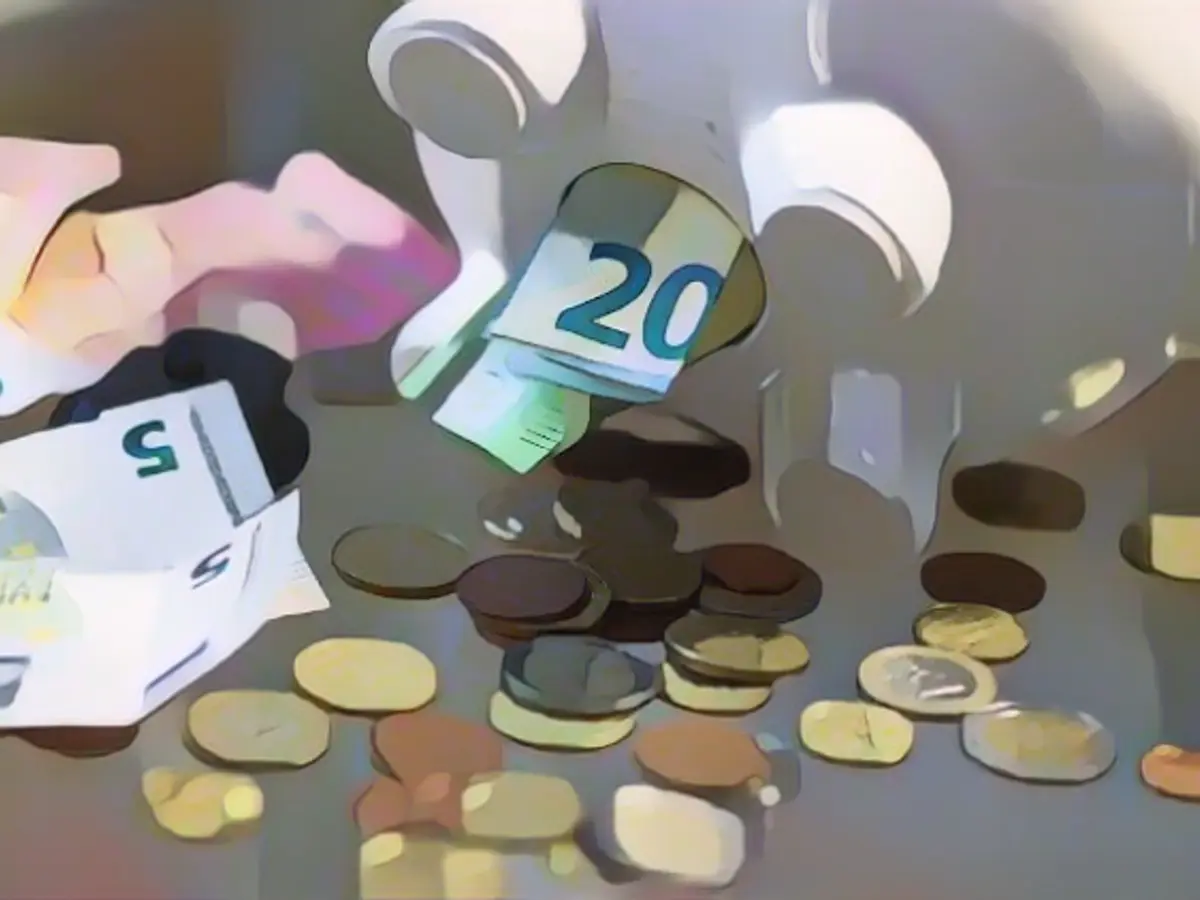Savers' happiness could quickly evaporate
While inflation has already fallen sharply, interest rates are relatively high. As a result, interest rates on fixed-term deposits at least are above the inflation rate for the first time in a long time, meaning that savings at the bank are actually increasing. However, a trend reversal is already emerging.
After years of drought, millions of savers benefited from higher interest rates for the first time again in 2023. "For most German savers, 2023 was a good year," says Oliver Maier from the comparison portal Verivox. However, it seems questionable whether interest rates for call money and the like will continue to rise in 2024. There are already signs of a trend reversal for fixed-term deposits.
Savers benefited in 2023 from the unprecedented series of interest rate hikes by the European Central Bank (ECB) in the fight against high inflation. Banks' interest in savers' deposits grew again. Financial institutions earn more interest on loans than they pay to savers. However, according to an analysis by the Deutsche Bundesbank, banks and savings banks initially took longer than before to pass on interest to savers. Since September 2022, the passing on of interest has been even slower than in the past, the experts wrote in the June issue of the Bundesbank's monthly report.
In the meantime, inflation has slowed. This has consequences for overnight money and the like. "The falling inflation rate and the weakening economy are increasing the pressure on the monetary authorities to cut key interest rates for the first time in the first half of 2024. The banks are already factoring this into their fixed-term deposit conditions," explains Maier. After rising until November, fixed-term deposit rates are now falling again slightly.
The comparison portal, which evaluates the interest rates of around 800 banks and savings banks, has not yet observed any falling interest rates across the board for call money. However, Maier expects that interest rates are unlikely to go any higher from now on. The cut-off date for the evaluation was December 18, and experience shows that interest rates tend not to change much around Christmas.
Fixed-term deposit interest rates higher than inflation on average
Since the beginning of 2023, the average interest rates on call deposit accounts, which savers can access at any time, have almost quadrupled from 0.46% to 1.70% for offers available nationwide. Depending on the bank, interest is paid monthly, quarterly, semi-annually or annually.
According to the analysis, savers currently receive an average interest rate of 3.30 percent for fixed-term deposits with a term of two years from financial institutions operating nationwide, compared to 2.17 percent at the beginning of 2023. This means that interest rates are now above the inflation rate of 3.2 percent. Average interest-bearing fixed-term deposits therefore generate slightly higher returns than the money invested loses in value due to inflation.
Savings are invested in a fixed-term deposit account for a certain period of time. Savers cannot dispose of the money during this time, which is why interest rates are generally higher than for overnight money. At the end of the term, the invested money is returned with interest.
Banks operating nationwide are more competitive and therefore often vie for savers with higher interest rates. Although savings banks and cooperative banks have also increased interest rates, many regional banks are lagging behind according to the analysis. Savings banks recently paid an average of 0.60 percent on call money - less than a quarter of what investors receive on average from banks operating nationwide. At 0.59 percent, the regional cooperative banks pay even less.
Concern about savings bank DNA
Regional institutions also offer less on average for fixed-term deposits. According to Verivox calculations, for an investment sum of 10,000 euros over a term of two years, this means 195 euros less interest income for savings banks and 173 euros less for local cooperative banks and PSD and Sparda banks. "Many savings banks and cooperative banks trust that their customers will not switch banks even if they could earn significantly more interest elsewhere," explains Maier.
Savings bank president Helmut Schleweis, who retired at the turn of the year, warned in October that customers should not be scared off by excessively low savings interest rates. In times of a rapid turnaround in interest rates, it is impossible to immediately offer high interest rates on all existing deposits. "But if we leave the impression that we no longer reward thriftiness, then it will eat away at our DNA of being a savings institution."
Read also:
- Year of climate records: extreme is the new normal
- Precautionary arrests show Islamist terror threat
- UN vote urges Israel to ceasefire
- SPD rules out budget resolution before the end of the year
- Despite the trend reversal, savers in 2024 might still benefit from high interest rates on call money, as banks and savings banks are currently factoring in the potential decrease in key interest rates for the first half of the year.
- By investing in fixed-term deposits with a term of two years, savers can currently earn interest rates higher than the inflation rate of 3.2%, ensuring slight gains despite inflation.
- Savings banks and regional cooperative banks often lag behind other financial institutions in offering competitive interest rates on both call money and fixed-term deposits, resulting in lower interest income for customers.
Source: www.ntv.de








